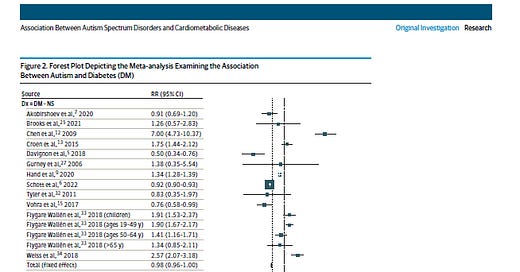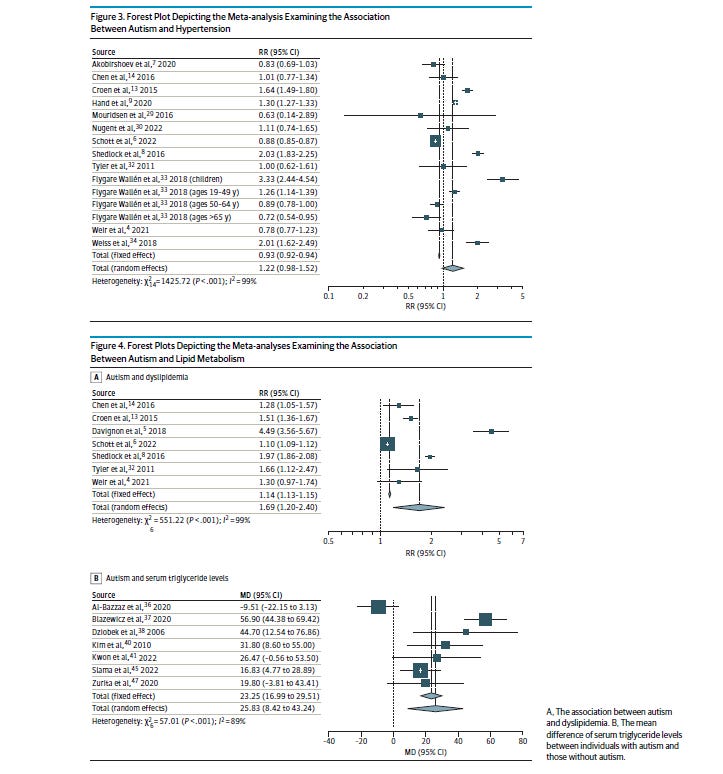Autism May (or May Not) Be Associated with Increased Risk of Diabetes, Dyslipidemia, and Heart Disease
Twenty years ago, moms and dad were clamoring for allopathy to see beyond autism and to address health issues with the entire patient. Now a noisy study seems to indicate three risks.
Currently, 1 in 44 children is diagnosed with autism by the age of 8 years in the United States. That’s up from 1 in 10,000 in the 1970s. People with a diagnosis of autism have long had poorer long-term outcomes regarding their health; in fact, their life expectancies are estimated to be between 12 and 30 years lower than people without the diagnosis.
Researchers from Texas conducted and published a systematic review and a meta-analysis of 34 studies that included 276 173 participants with autism and 7 733 306 participants without autism in search of conditions known to have a morbidity risk.
They found that having a diagnosis of autism is associated with greater risks of developing diabetes overall (RR, 1.57; 95% CI, 1.23-2.01; 20 studies), type 1 diabetes (RR, 1.64; 95% CI, 1.06-2.54; 6 studies), and type 2 diabetes (RR, 2.47; 95% CI, 1.30-4.70; 3 studies). Autism was also associated with increased risks of dyslipidemia (RR, 1.69; 95% CI, 1.20-2.40; 7 studies) and heart disease (RR, 1.46; 95% CI, 1.42-1.50; 3 studies).
People with autism were found to be 46% more likely to have heart disease, 64% more likely to develop type 1 diabetes, and 46% more likely to experience type 2 diabetes. Children with autism were nearly twice as likely to develop diabetes (184%) and high blood pressure (154%).
The study authors reported that they did not find an increased risk of hypertension or stroke, suggesting a different mechanism of disease pathophysiology of heart disease behind the increased risk in autism.
Upon reading the study, I noticed that the meta-analysis Forest Plots were anything but definitive. Compared to other meta-analyses we’ve seen, such as the Ivermectin signal for early treatment efficacy and prophylaxis, the signal for these associations in autism is deplorably messy. (They are dropped at the bottom of this article. Very noisy!).
Specific Personal Risk Should Be Assessed and Addressed, As Needed: Science Says Supplements Reduce Risk
Parents of children with autism, and adults with autism, therefore, should expect complete biomedical workups indicating specific personal risk before accepting any pharmaceutical recommendations from their physicians. A diagnosis of autism is insufficient evidence for any individual patient to be prescribed any diabetes or heart disease medicines.
Importantly, however, lifestyle decisions and other specific tactics employed by parents of kids with autism, such as focusing on a healthy microbiome, is just generally good practice for human health.
A meta-analysis published in the Journal of the American College of Cardiology in 2022, for example, found that randomized controlled intervention trials had the strongest evidence of heart benefits in the following supplements:
That study found that omega-3 fatty acids (fish oil), decreased mortality from cardiovascular disease, and folic acid supplementation lowered stroke risk (MTHFR families read up on studies on folinic acid or methyl folate). They also found that Coenzyme Q10, decreased all-cause mortality (death).
The 2022 study also found that other supplements had robust evidence of reducing cardiovascular risk were vitamin D, zinc, curcumin, quercetin, zinc, omega-6 fatty acid, alpha-lipoic acid, catechin, L-arginine, L-citrulline, magnesium, flavanol, genistein, and melatonin.







No doubt linked to poor diet. It is sometimes very difficult to follow a good diet for typical kids let alone for a child with autism who very likely has challenging behavioral issues. Parents need to be hyper involved and vigilant. Sadly many can’t stay that engaged due to all the other issues that they must deal with. Fix the diet and you avoid those adverse health problems!
Autism was rare before the sun ( and its vitamin D) were villified in the 1970s. Chronic vitD deficiency/starvation in the mother and then the child causes gestational and then post-natal developmental defects. The specific region of the brain affected is the midline cerebellar vermis, which develops postnatally and is involved in learning/memory and higher order behaviors. Interestingly, there is a north-south gradient with respect to autism prevalence, vitD related. Somalians relocated to Minneapolis develop autism, a condition so foreign that Somalis have no word for it in their language. Furthermore, a condition called Williams Syndrome involves hypertrophy and malformations in the vermis that result in hypersociability...almost the behaviorally opposite condition to autism. The vitD-autism-cerebellar link is a Nobel Prize worthy line of research for a young aggressive neuroscientist.